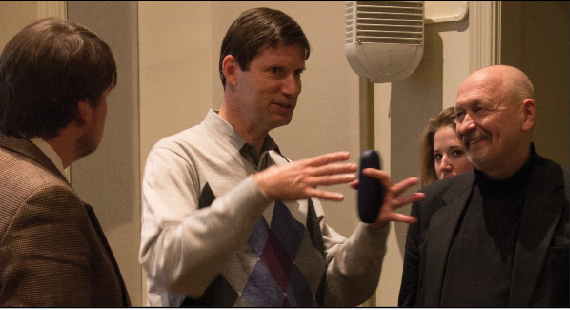Putting Out Fires
Alumni Discusses Government Position and Stabilization Operations

Andrew Hyde ‘81, part of the Bureau of Conflict and Stabilization Operations, speaks with audience after his presentation on Oct. 24, “Putting out the Fires.”
As part of the Clarke Forum’s Leadership in an Age of Uncertainty Series, Andrew Hyde ’81 held a talk entitled Putting out the Fires on Thursday, Oct. 24 in the Stern Great Room. Hyde is a Dickinson alumnus who works for the Bureau of Conflict and Stabilization Operations (CSO), a branch of the state department that engages in conflict prevention, crisis response and stability promotion in nations in conflict.
Hyde’s discussion focused on the operations and objectives of the CSO with particular attention to how the bureau relates to advancing US foreign policy and was conceived in reaction to the Iraq war. Hyde explained the five criteria that the bureau looks at when they seek to stabilize a nation: Safety/Security, Government, Justice/Law, Economy and Social Wellbeing. According to Hyde, these criteria were developed to address the mishandling of Iraq post-invasion. He enumerated the key issues with the occupation, which were lack of focus and a lack of prioritization. These shortcomings proved expensive and threatened the efficiency of the operations in Iraq. Hyde gave an example of an advanced hospital that was built far from any population centers and roads, and was prohibitively expensive to run, leading to its abandonment by the Iraqi government.
He concluded that the US has since decided to focus on civilian led stabilization, which led to the creation of the CSO in 2012. He described the process by which the CSO identifies unstable areas and makes the decision to go in. Known as the Quadrennial Diplomacy and Development Review, the process focuses on using locally driven analysis derived from the inhabitants, more focused strategies of dealing with the problems and partnering with non-traditional US allies. They are also interested in having a measurable long-term impact and the CSO is structured in such a way that it is flexible and able to access its resources quickly.
The final part of the presentation was a focus on the CSO’s current “Priority Engagements.” Their most well known effort has been aiding the training of the rebel Syrian government that has set up shop in Turkey, and their most recent success has been in Kenya, where the CSO worked to decrease the amount of violence and death surrounding the elections and ensuring that the elections were successful and transparent. They are also involved in Honduras, Nigeria, and are negotiating a peace deal between the rebel state Casamance and Senegal.
After the presentation, Hyde opened the floor to audience questions. He was pressed for his thoughts on the use of a large standing army, stating that while he believed a strong army is always a good diplomatic bargaining chip, we will see an inevitable shrinkage in armed forces as war shifts towards more focused Special Operations-based warfare. He was also asked to speculate on the current situation in Syria if Assad had lost, and he said that the situation would still likely be tense. He was also asked about the CSO’s relationship with the Karzai government in Afghanistan. Most of the US dealings with the Karzai administration took place before the creation of the CSO and the US is also not the most well liked state in the world.
Following the conclusion of the question and answer session the Clarke Forum presented Hyde with a commemorative plaque.





